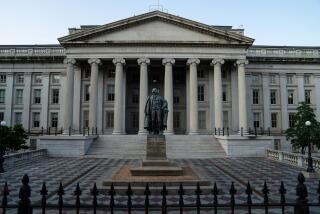Balanced Budget Now Possible, Analysts Say
- Share via
WASHINGTON — Providing fresh evidence that the economy is rebounding, the Congressional Budget Office on Wednesday backtracked on gloomy deficit predictions and said a balanced budget may still be within reach this year.
The nonpartisan office now projects that, thanks to a surprising surge in the economy, current federal budget policies would produce a surplus of $5 billion this year and $6 billion in 2003--not the deficits of $21 billion and $14 billion it had projected in January for those two years.
“The economy is currently rebounding in a remarkable fashion,” CBO Director Dan L. Crippen told the Senate Budget Committee.
The change in outlook is small in the context of a federal budget that totals about $2 trillion. But the shift in the CBO’s projections could have a significant political effect.
For instance, the numbers should provide new impetus to efforts by House Republican conservatives to persuade their leadership to propose a balanced budget this year, even though President Bush has said that war and recession justify running a deficit.
“We’re closer to a balanced budget than it appeared a few weeks ago,” said Rep. John B. Shadegg (R-Ariz.). “We think that’s good news.”
The revised CBO forecast also underscored uncertainty about the trajectory of the economy--and the vagaries of economic projections themselves.
“It’s just like forecasting the weather,” said House Budget Committee Chairman Jim Nussle (R-Iowa). “Sometimes the wind changes and you have to rework the whole forecast.”
Precisely because there are continuing questions about the strength of the recovery, Congress is still looking for ways to pass long-stalled legislation to stimulate the economy. Republicans mounted a new effort Wednesday to end months of partisan bickering and pass a stripped-down bill to provide an additional 13 weeks of benefits to the unemployed and modest tax breaks for businesses. The measure is expected to pass today in the House, then go to the Senate.
“There’s been a lot of pressure to do something,” said Rep. Ray LaHood (R-Ill.). “We took care of the airlines [following the Sept. 11 terrorist attacks]. We took care of New York. We never took care of the little guy.”
Democrats welcomed the new bill because it omitted the GOP tax cuts they most opposed. “House Republicans finally released the hostages--and these are the millions of unemployed people who have suffered, especially after Sept. 11,” said Rep. Charles B. Rangel (D-N.Y.).
The CBO’s new projections were laid out in a report that included several notes of caution. For one, the predictions of modest surpluses were based on continuation of current policies--and thus assume no new tax cuts or spending increases are adopted. That is unlikely because Congress is expected to approve much of Bush’s proposed increases in defense and homeland security spending.
Indeed, CBO analysts estimated that if Congress passed all that Bush requested, the budget would run a $121-billion deficit in fiscal 2003, which starts Oct. 1, and a $51-billion deficit in 2004. Bush’s budget office had offered a more optimistic view, estimating that its spending plan would run a deficit of $80 billion in 2003 and $14 billion in 2004.
The main reason for the CBO’s new projections is that the economy did not decline in the fourth quarter of last year, as the office had expected. Instead, it grew by 1.4%.
The CBO attributed the economic surge in part to surprisingly strong consumer spending. The report also cited evidence of a rebound in business spending and unexpected productivity growth.
But Crippen warned that the outlook for growth in the coming months is “extremely uncertain.”
Proponents of acting on an economic stimulus bill say it is still needed as a safeguard against recessionary relapses. But action on stimulus legislation has been stalled for months by bickering between the parties over the proper mix of tax cuts and unemployment benefits.
More to Read
Get the L.A. Times Politics newsletter
Deeply reported insights into legislation, politics and policy from Sacramento, Washington and beyond. In your inbox twice per week.
You may occasionally receive promotional content from the Los Angeles Times.











